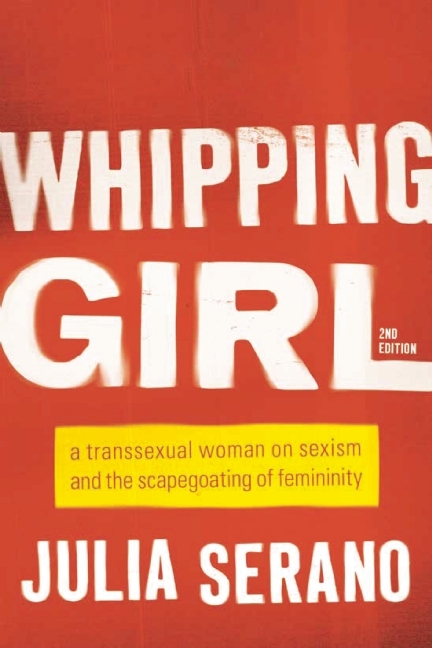Book discussion: Whipping Girl, by Julia Serano
Continuing my project of improving my understanding of what it means to be transgender, I finally tackled Julia Serano's foundational text on transgender politics, sexism, and the intersections between all sorts of gender-related biases. The book was first published in 2007, which makes it dated in some areas, and was updated for the 2014 re-release, which is already 10 years out of date. An afterword written in 2023 helps to keep it up to date and puts things in perspective, as we enter a new period of virulent anti-trans hysteria (made concrete by a lot of laws being floated, too many of which are passing).

Title: Whipping Girl: A Transsexual Woman on Sexism and the Scapegoating of Femininity
Author: Julia Serano
Publication Information: Originally published 2007, Seal Press (390 Pages). I read the 2016 Kindle edition, with an afterword from 2023.
Source: Library
Publisher's Blurb:
In Whipping Girl, biologist and trans activist
Julia Serano shares her experiences and insights—both pre- and
post-transition—to reveal the ways in which fear, suspicion, and
dismissiveness toward femininity shape our attitudes toward trans women,
as well as gender and sexuality as a whole.
Serano's well-honed
arguments and pioneering advocacy stem from her ability to bridge the
gap between the often-disparate biological and social perspectives on
gender. In this provocative manifesto, she exposes how deep-rooted the
cultural belief is that femininity is frivolous, weak, and passive.
In
addition to debunking popular misconceptions about being transgender,
Serano makes the case that today's feminists and transgender activists
must work to embrace and empower femininity—in all of its wondrous
forms.
My Discussion:
Note: this is not a review. I don't feel competent to critique the book, but only to share a few ideas and insights it sparked in me, as a cis woman who tends to assume I'm fairly enlightened, and who identifies as feminist. Those personal details are important, because a lot of this book is about the ways in which feminism does--and mostly doesn't--support trans women. The ways in which, in fact, feminists turn out to be, well, kind of sexist?
I came of age in the late 1970s, a period in which feminism was somewhat combative, and definitely looked askance at "femininity," which we pretty much assumed to be a marker of women co-opted by the patriarchy into accepting norms of dress and appearance that showed just where they stood in the struggle for power.
We may have been a little misguided, though I still struggle with much standard "feminine" clothing and behavior. After all, the line from foot-binding to high heels is hard not to draw, and so much feminine clothing seems to restrict the things a person can do while wearing it. But it is equally hard not to admit some truth of Serano's accusation that my attitude actually reflects a valuation of traditionally male activities and ways of existing in the world over female ways. And that, Serano argues, is why much anti-trans feeling is pure old-fashioned sexism--including much of the anti-trans attitudes coming from the feminist community.
I can think of a few arguments why my view has validity, but I can also watch my daughter mowing the lawn in a skirt (but not heels; she has inherited my feelings about uncomfortable shoes). She can be feminine and still do what needs doing.
Easier to think about is something Serano writes about the desire to understand--which should be a good thing, but has it's own pitfalls:
"Eventually, I realized that dwelling on 'why' was a pointless endeavor--the fact is that I am transsexual and I exist, and there is no legitimate reason why I should feel inferior to a cis-sexual because of that" (p. 188). She goes on to ask the cis reader if we have ever asked why we are cis. Eventually I sorted out a way of seeing this: I am left-handed, which is decidedly less common than being right-handed. But I don't have any need to ask why I'm a southpaw (though a science-minded part of me would like to know).
[That example may be more on point than I originally thought, given that as little as 100 years ago it wasn't okay to be left handed, and great efforts were made to train/beat it out of children.]
I made many more notes and had a lot of thoughts about this book but won't go into it all right now. Suffice to say that while some parts felt very dated and others too academic to be of general interest, the book sparked a great deal of thought, which is never a bad thing. I'll leave this here, aware I've not at all done justice to a complex work, and welcome open-minded discussion.
Final book-reviewish note:
This book is a collection of essays written over a period of years, many of them for academic or semi-academic audiences. It's not always easy reading in any sense of the phrase. It is almost always thought-provoking.
FTC Disclosure: I checked Whipping Girl out of my library, and received nothing from the writer or publisher. The opinions expressed are my own and those of no one else. I am disclosing this in accordance with the Federal Trade Commission's 16 CFR, Part 255: "Guides Concerning the Use of Endorsements and Testimonials in Advertising."
©Rebecca M. Douglass, 2024 As always, please ask permission to use any photos or text. Link-backs appreciated. Don't miss a post--Follow us!

Such intriguing ideas! Thank you for bringing it to my attention without having to read it 🫤
ReplyDeleteThanks! I'm pretty sure the book would reward a re-reading and further discussion.
Delete